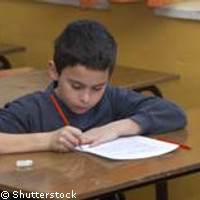Poor memory not lower intelligence to blame for bad grades, finds study
Poor working memory rather than lower intelligence explains why some children are falling behind at school, a new study in the UK has found. Researchers involved in the study have developed what they say is the world's first tool to assess memory capacity in the classroom with a view to helping teachers adapt their teaching approaches. Working memory is the ability to store information temporarily in your head. We use this type of memory every day when we have to remember a pin code or when we are following a recipe but are no longer looking at the page in the recipe book. Children at school also use this type of memory when writing down instructions from their teachers. 'Working memory is a bit like a mental jotting pad and how good this is in someone will either ease their path to learning or seriously prevent them from learning,' says Dr Tracy Alloway from Durham University's School of Education, who led the research. In a survey of 3,000 school children, the researchers found that 10% of the children were suffering from poor working memory, which was causing serious havoc to their school work. In many cases, the researchers observed that teachers were wrongly identifying these children as having lower attention spans or lower levels of intelligence. 'From the various large-scale studies we have done, we believe the only way children with poor working memory can go onto achieving academic success is by teaching them how to learn despite their smaller capacity to store information mentally,' says Dr Alloway. 'Currently, children are not identified and assessed for working memory within a classroom setting. Early identification of these children will be a major step towards addressing under-achievement. It will mean teachers can adapt their methods to help the children's learning before they fall too far behind their peers,' she adds. Identifying children as early on as four years old will now be possible using the tool developed in the study, says Dr Alloway. The tool comprises a Working Memory Rating Scale (WMRS) checklist, which helps teachers to spot children who may have a problem without subjecting them to any tests. If a child ticks many of the boxes on the list, a teacher can then get the child to take a computerised Automated Working Memory Assessment (AWMA). In addition to assessing children's performance, the tool also provides suggestions on how teachers can deal with children with poor memory so that they do not fall behind in their work. These include repeating instructions, using simple sentence structures and breaking down tasks into smaller, more manageable chunks of information. The tool has been put to the test in 35 schools across the UK and has been translated into 10 other languages. According to its users, the tool is already making a visible difference. 'We are already beginning to see children in a different light knowing more about the difficulties faced by children with impaired working memory,' says Chris Evans, head teacher in one of the schools where teachers are being trained to use the tool. 'We realise that they are not daydreamers, inattentive or underachieving, but children who simply need a different approach. We think these new ways of learning can help both the teacher and the children to successfully complete their work.'
Countries
United Kingdom



